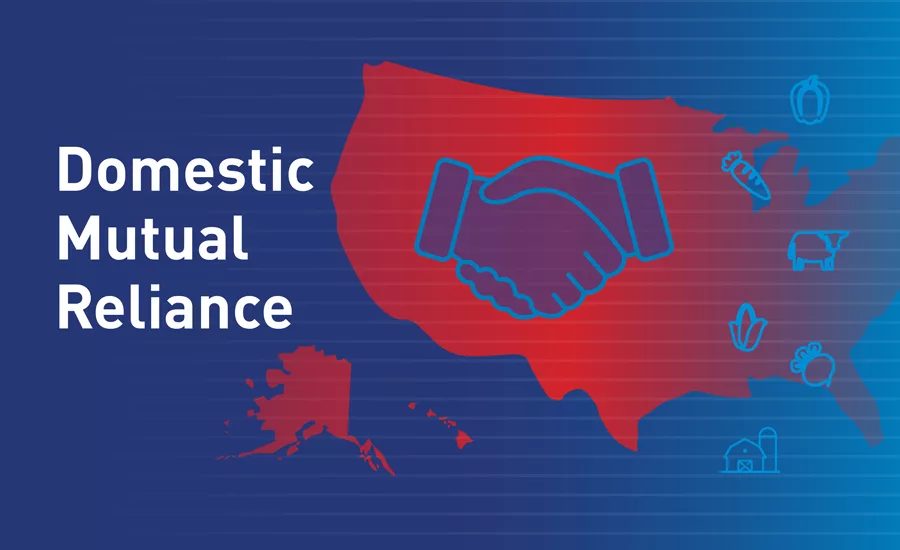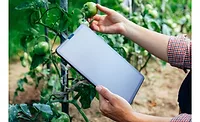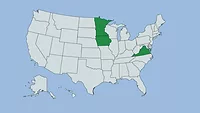FDA and States use Rapid Response Teams Approach to Combat Foodborne Illness through Domestic Mutual Reliance

In 2008, the U.S. Food and Drug Administration (FDA) launched the Rapid Response Team (RRT) state partnership program to reduce the time it takes to investigate and stop foodborne illness outbreaks. Not long after, in 2011, the Food Safety Modernization Act (FSMA) became law. After more than a decade, the 2008 RRT partnership program has proven so successful that FDA is using it as a model for expanding state partnerships to support implementation of FSMA through the Domestic Mutual Reliance program.
Domestic Mutual Reliance enables FDA and states with comparable public health systems to rely on, coordinate with, and leverage one another’s work, data, and actions to ensure food safety. These partnerships are key to the success of the New Era of Smarter Food Safety, an FDA initiative that represents a new approach to food safety, leveraging technology and other tools to create a more digital, more traceable, and safer food system.
The FDA funds RRTs in 20 states, and another four states participate in the program in a voluntary, non-funded capacity. Designed to provide an integrated and sustainable response capability for food emergencies, the RRTs have shortened the duration of foodborne illness outbreaks, preventing illness and saving lives in the process. Building on this model has potential to further improve efficiency and effectiveness of our response efforts. Consider these three recent examples.
Closing a Cold Case: In early 2020, RRTs and FDA staff in Michigan and California resolved a multistate outbreak of Listeria monocytogenes illness linked to enoki mushrooms. Their investigation, triggered by commonalities between Michigan’s epidemiological surveillance data and new international sequencing matches, provided traceback documentation and positive mushroom samples that solved a cluster of L. monocytogenes illnesses with onset dates ranging from 2016–2019. Prior to the investigation in 2020, there was no conclusive evidence as to what food product was causing these illnesses.
With this outbreak, we were dealing with a true needle in a haystack. There were no conclusive epidemiological data pointing to a single food vehicle. It was a mystery with domestic and international components, as the enoki mushrooms were being imported from abroad, and there were genetically similar illnesses outside of the United States. The RRT structure helped us focus on our resources and rely on our partnerships to resolve the crisis. Traceback, epidemiology, and laboratory evidence came together seamlessly, and that would not have occurred without our state RRT partners.
Previously established relationships among the Michigan RRT, the California RRT, and FDA emergency response staff—including familiarity with team capabilities—helped boost efficiency as the teams responded.
The RRT response enabled nationwide action. Following the state laboratory analyses, the U.S. Centers for Disease Control and Prevention (CDC) and FDA issued consumer advisories, and three firms voluntarily recalled enoki mushrooms. On June 9, 2020, CDC declared that the outbreak appeared to be over.
Looking for quick answers on food safety topics?
Try Ask FSM, our new smart AI search tool.
Ask FSM →
Collaborating Across States Leads to Sprouts Recall: In December 2019, epidemiologists in Iowa identified a cluster of genetically-linked Shiga-toxin-producing Escherichia coli illnesses. Information from epidemiologic interviews with ill patients revealed that ill patients had eaten at locations of a national sandwich shop chain and that sprouts were the likely contaminated ingredient. The Iowa RRT began working with the state laboratory, epidemiologists, and FDA.
The Minnesota RRT, which had seen a previous sprouts outbreak linked to the same sandwich shop chain, helped connect the Iowa RRT to the appropriate person at the sandwich shop chain’s parent company. When contacted by the RRT, the parent company named its sole supplier of sprouts for the sandwich shop chain. The strength of the epidemiologic investigation, combined with the fact that the overwhelming majority of that supplier’s sprouts went to locations of the sandwich shop chain, enabled a highly focused traceback and started the wheels in motion for a potential recall.
The sprout supplier brought samples of irrigation water and sprouts to the Iowa lab on Dec. 23. The next day, the Iowa RRT’s laboratory partner, the State Hygienic Laboratory, began analysis of the samples. As the analysis progressed, the Iowa laboratory used its whole genome sequencing capabilities—including equipment purchased with FDA special project funds—to find that the clover sprouts were contaminated with Shiga-toxin-producing E. coli that matched the outbreak strain. The sprout supplier recalled the clover sprouts and a recall notice was posted on the FDA website on December 27. The sandwich shop chain removed sprouts from its menu until further notice.
In this case, the RRT structure enabled us to quickly identify the cause of this outbreak. Fortunately, quick collaboration protected consumers from additional illness.
RRT and Federal Collaboration Identifies Source of Contaminated Romaine: In May 2020, FDA published the findings of a national investigation into three outbreaks of E. coli O157:H7 illnesses from the fall of 2019, all linked to romaine lettuce. Together, the outbreaks sickened 188 people starting in September 2019.
FDA, CDC, and RRTs worked together to determine the source of the outbreaks—a common grower with multiple ranches and fields in Salinas, California. Especially critical to narrowing the scope of the investigation and focusing the traceback were the salad samples collected by Maryland and Wisconsin partners, where E. coli O157:H7 recovered from the salad was highly related by whole-genome sequencing to the outbreak strain. Swift action by RRTs to coordinate sample collection, share laboratory analytical packages, and conduct rapid traceback on positive samples provided the evidence necessary to narrow the investigation focus and subsequent FDA and CDC consumer advisory to romaine from the Salinas Valley region. This avoided the need for a recommendation against consuming all romaine during a critical time of year and benefited both consumers and industry.
On-farm investigations at the common grower in Salinas revealed that a potential contributing factor was the proximity of cattle to the produce fields identified in traceback investigations. These findings reinforce concerns about the possible effect of neighboring land usage on the safety of leafy green crops and highlight the significance of reviewing operations and exercising risk mitigation. They also underscore the RRTs’ role in advancing an action-oriented approach to public health emergency response. Such collaboration is recommended in FDA’s 2020 Leafy Greens STEC Action Plan.
As we move forward with implementing Domestic Mutual Reliance, we want to build on the success of the RRTs over the past 12 years. As we have seen in the RRT program, trust, commitment, communication, and collaboration are the foundations of our FDA-state partnerships. From these foundations, our intent is to build relationships and engage in regular communication with our partners to support success in Domestic Mutual Reliance.
We are working with state public health agencies, state agriculture departments, and state laboratories in pilot projects aimed at improving industry compliance, reducing foodborne illness outbreaks, reducing redundancy, and protecting public health.
For example, FDA and the New York State Department of Agriculture and Markets conducted a 24-month pilot to increase integration in laboratory review and analyses of imported products sold at retail. FDA and the California Department of Public Health completed an 18-month pilot project focusing on collaborative inspectional and compliance activities and improved data sharing. FDA also conducted a 12-month pilot project with the Wisconsin Department of Agriculture, Trade, and Consumer Protection to minimize duplication of inspectional work and improve collaboration and information sharing. The pilot covered inspections for dairy products and manufactured foods.
We are using the experiences gained from our pilot projects to inform how to expand collaboration, recognizing the need to remain flexible for the needs of our state partners as we establish a framework for working together. Documentation, information sharing, and resource-leveraging and deployment will be at the core of our collaborative work.
To learn more, visit our Domestic Mutual Reliance web page and our Rapid Response Teams web page.
Erik Mettler, M.P.A., M.P.H., is assistant commissioner for the Office of Partnerships and Policy, Office of Regulatory Affairs, at FDA.
Natalie Adan, is the food safety division director at the Georgia Department of Agriculture and president-elect of the Association of Food and Drug Officials.








